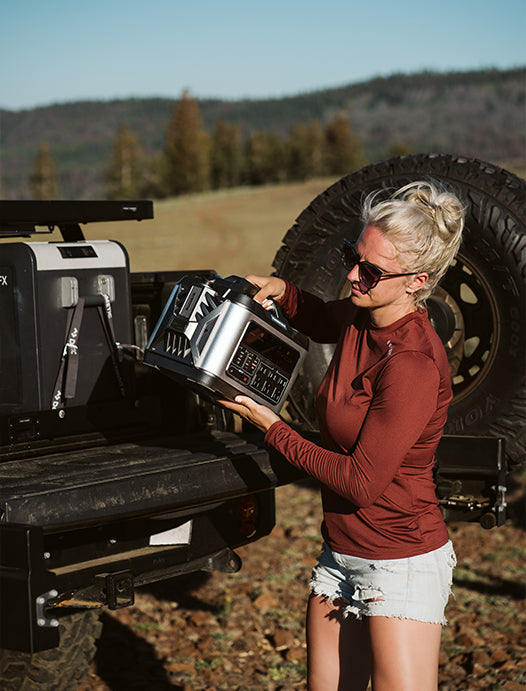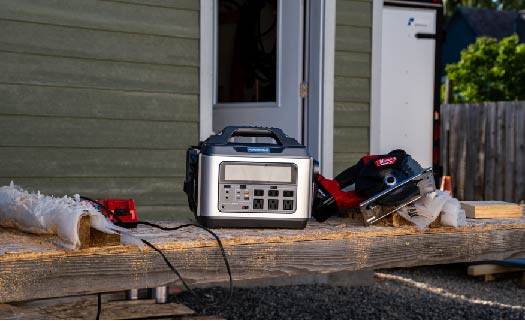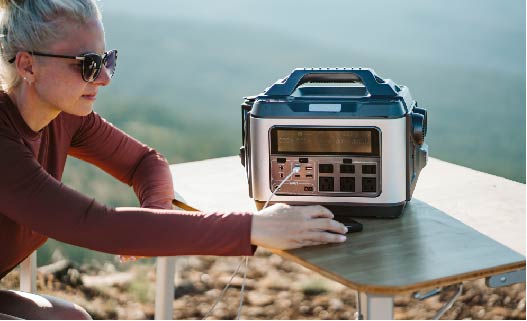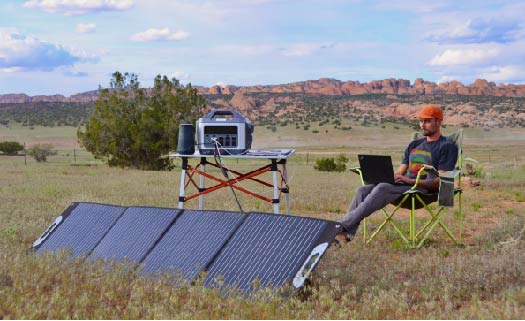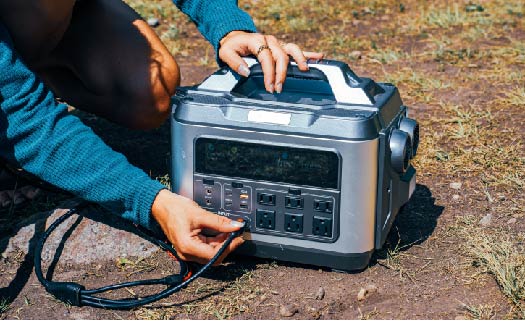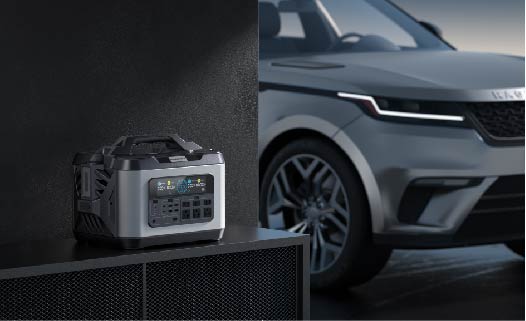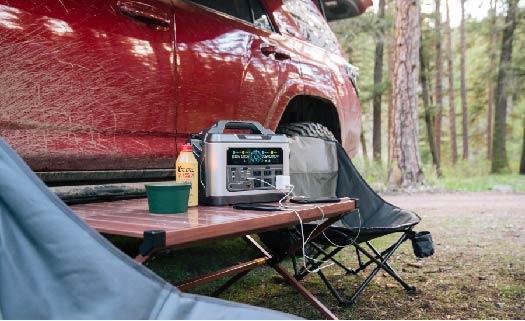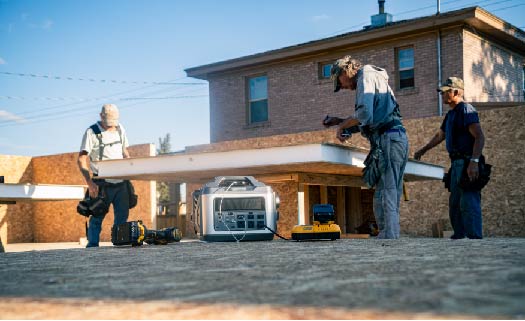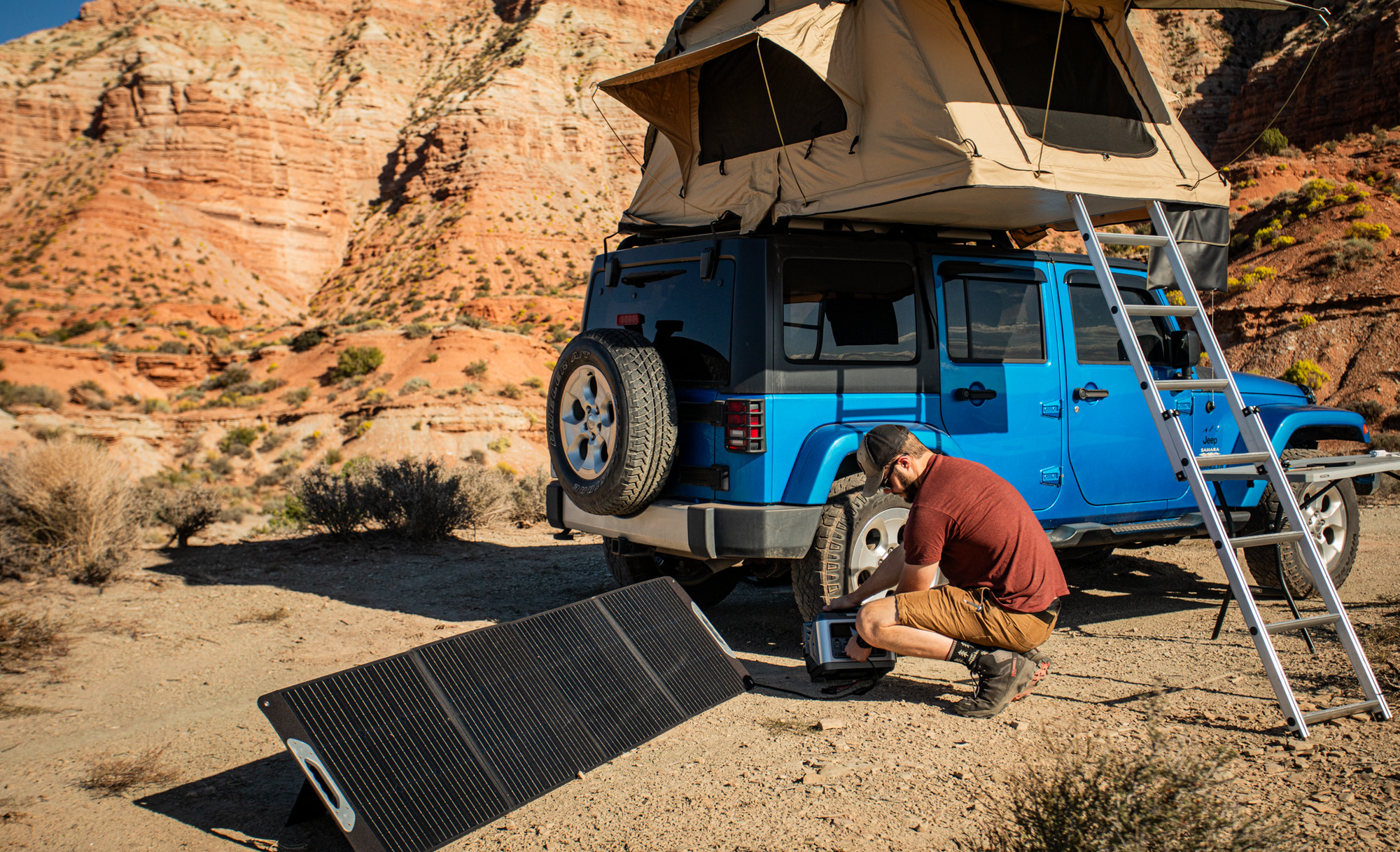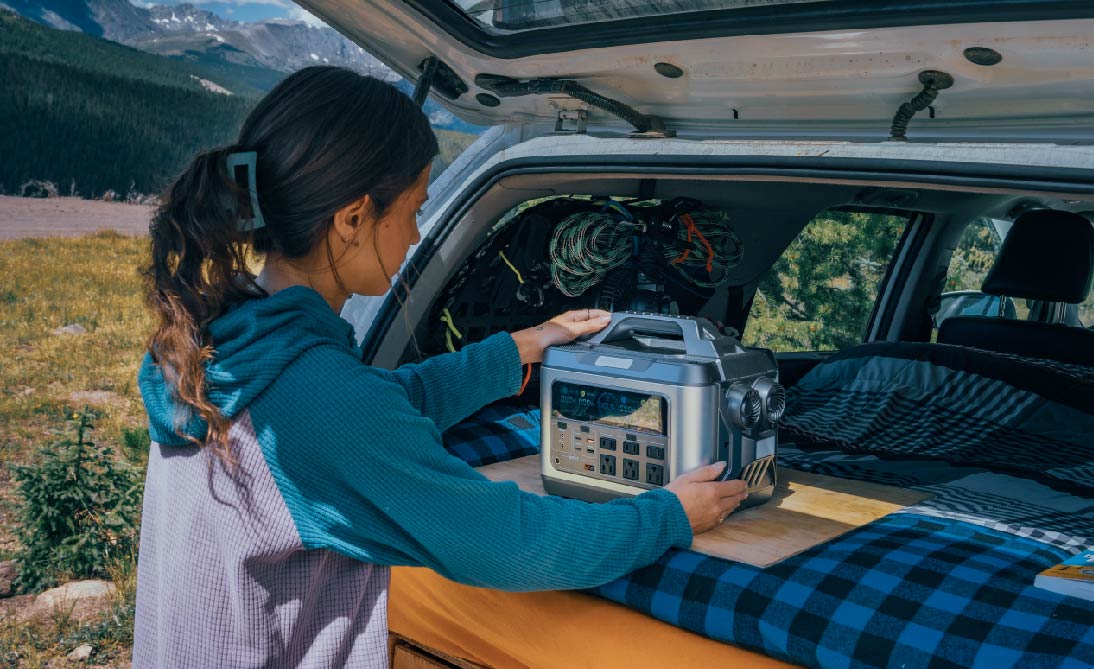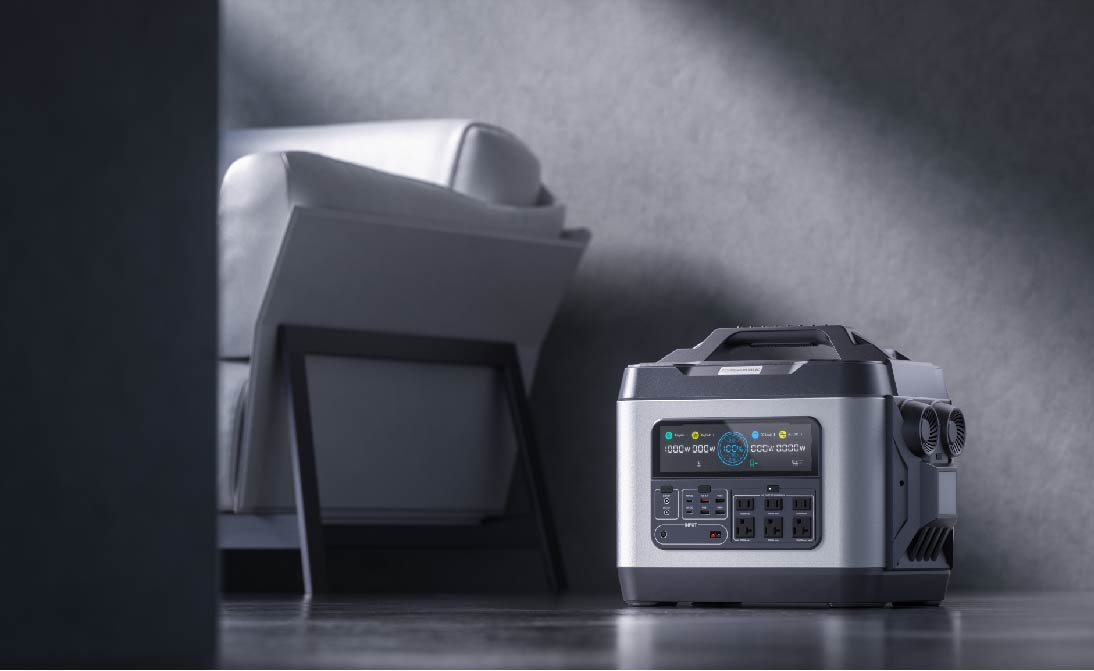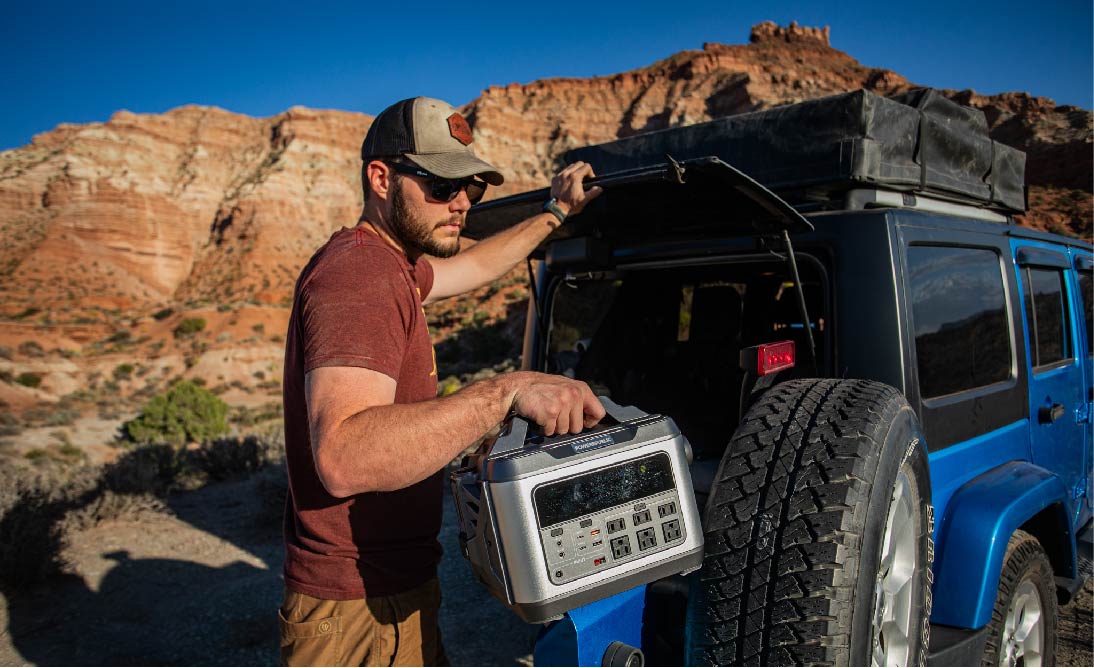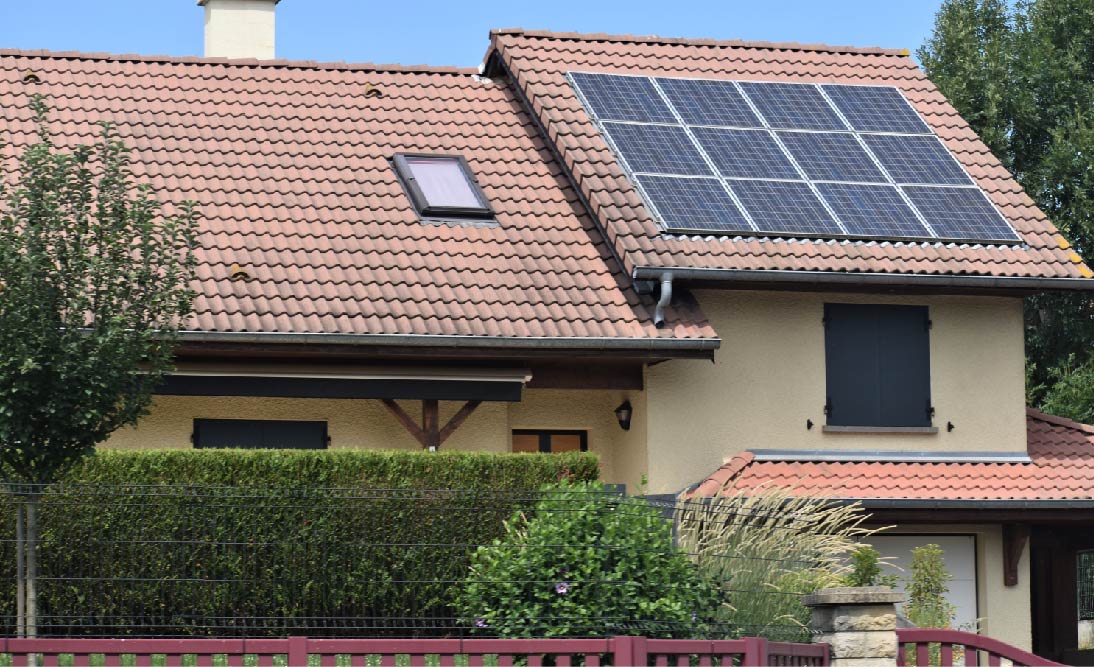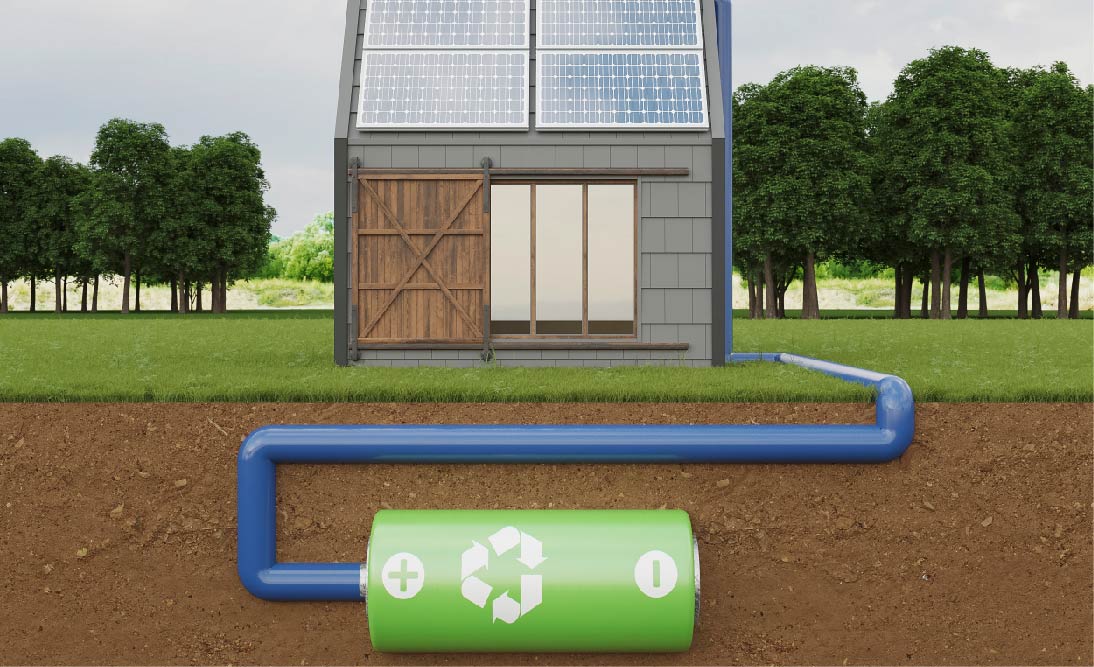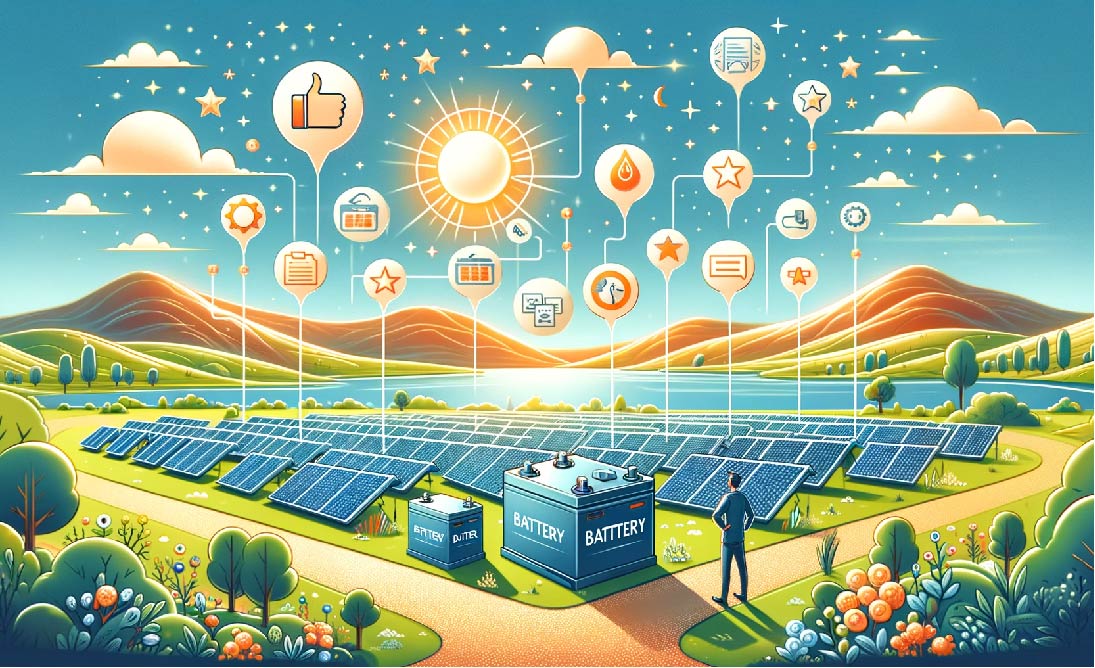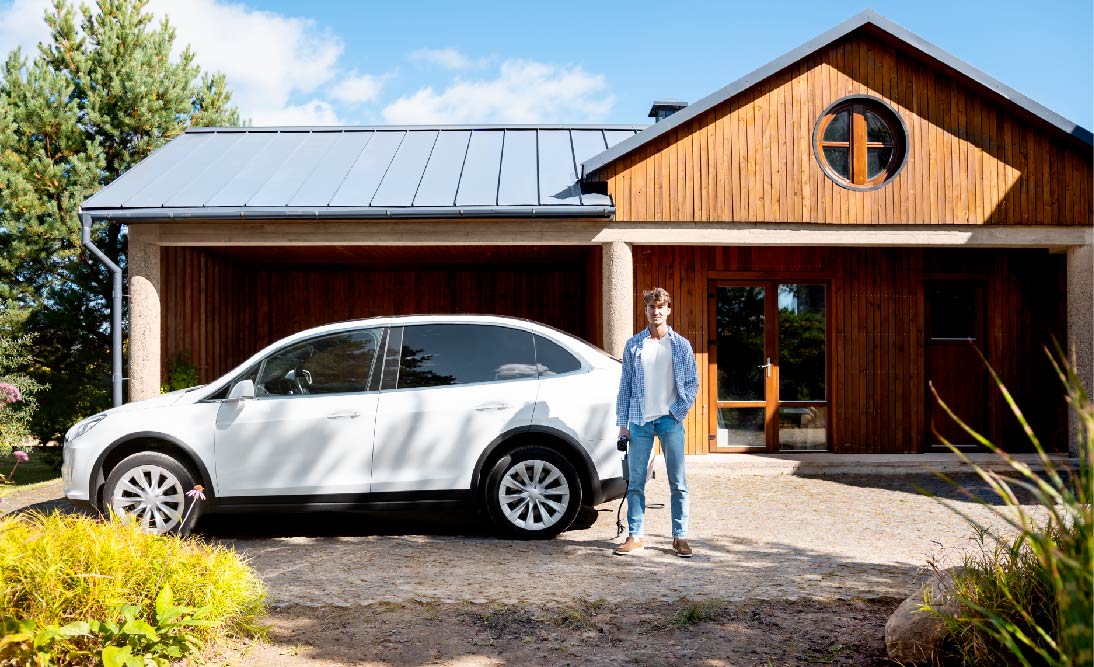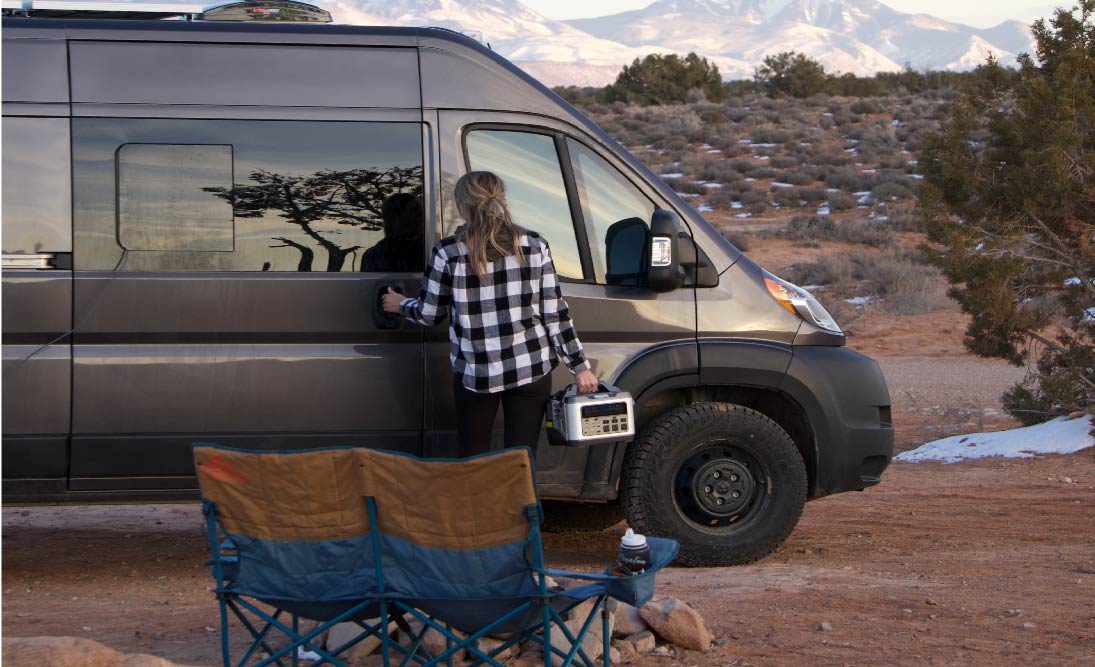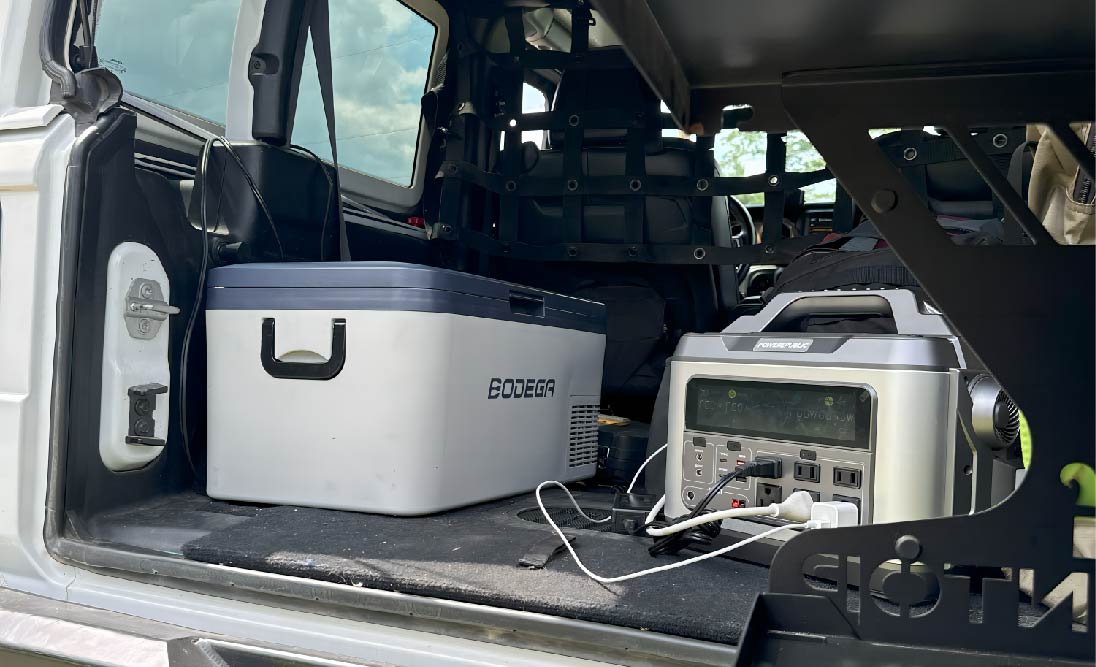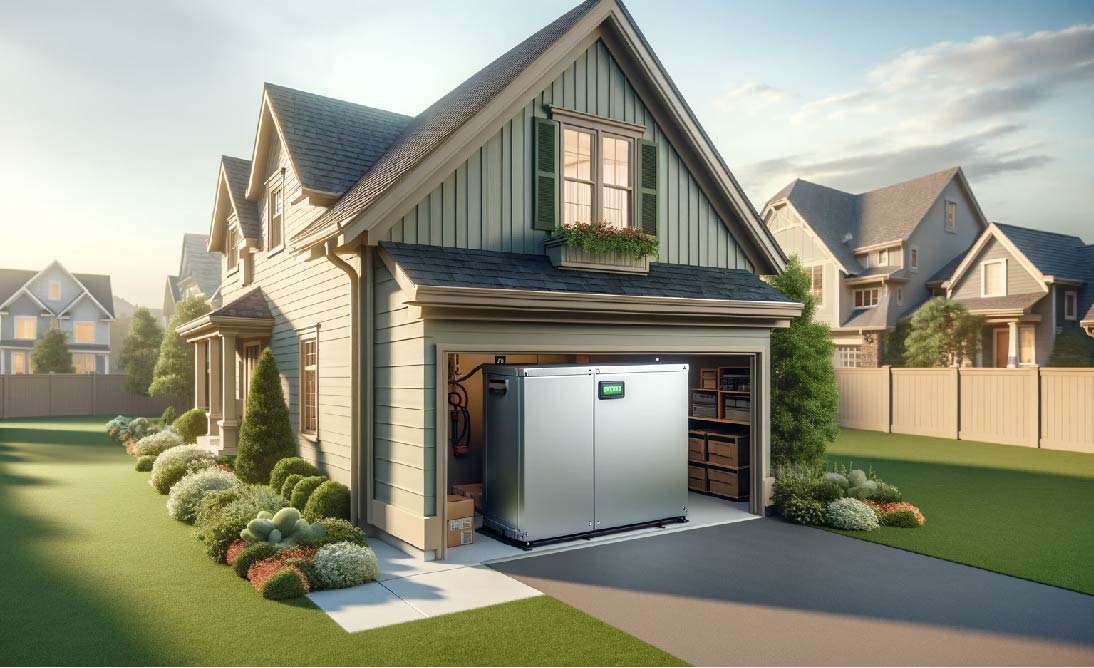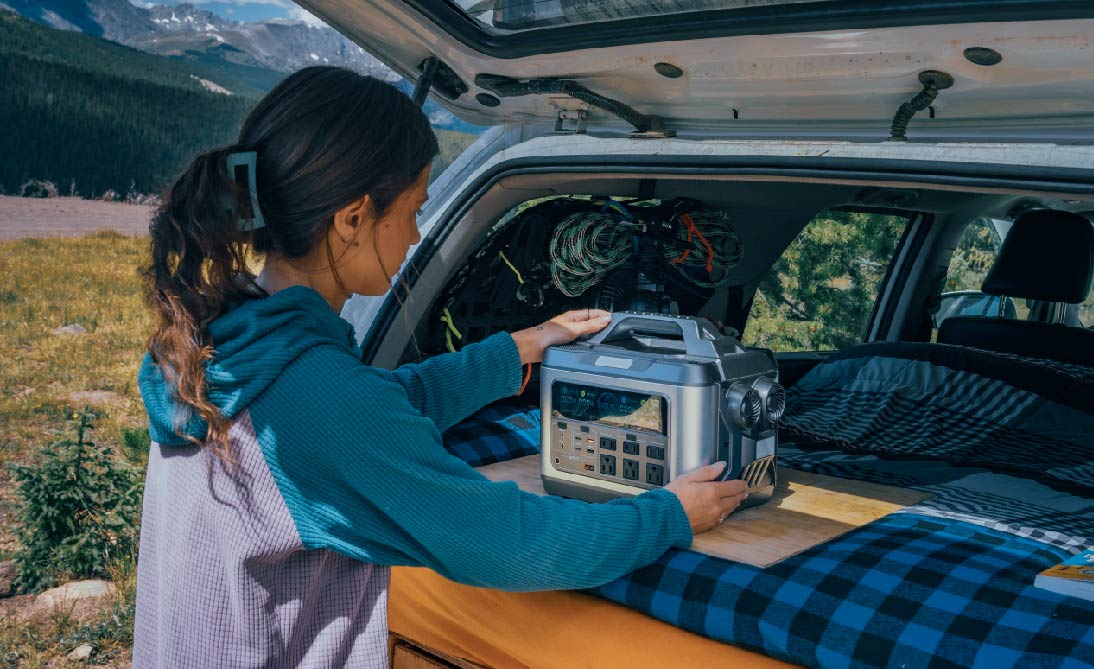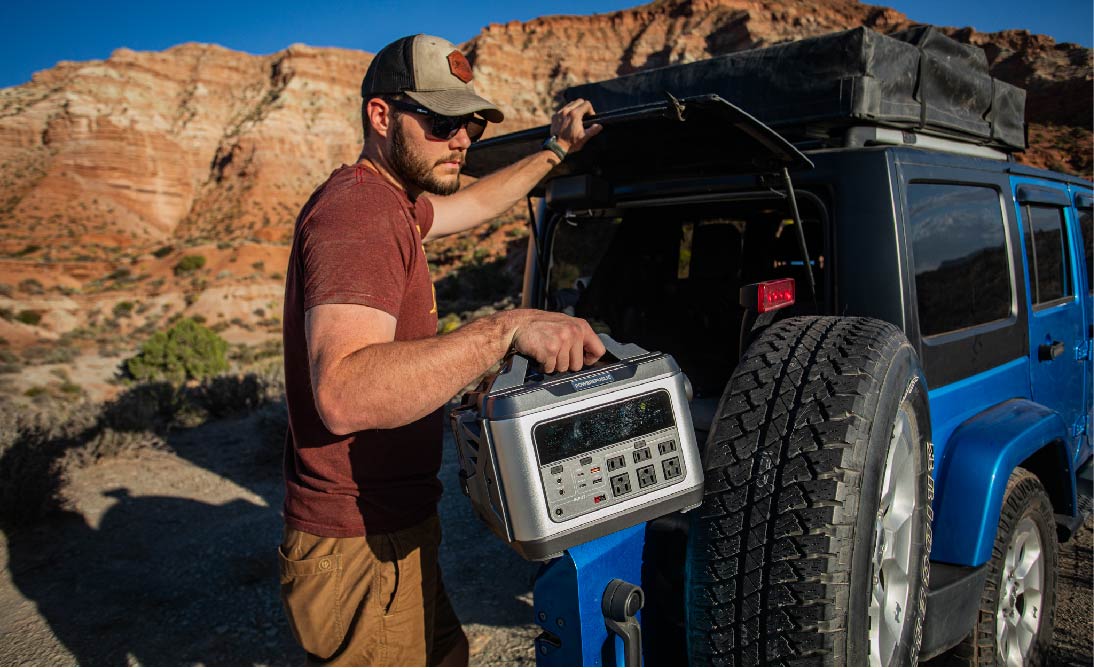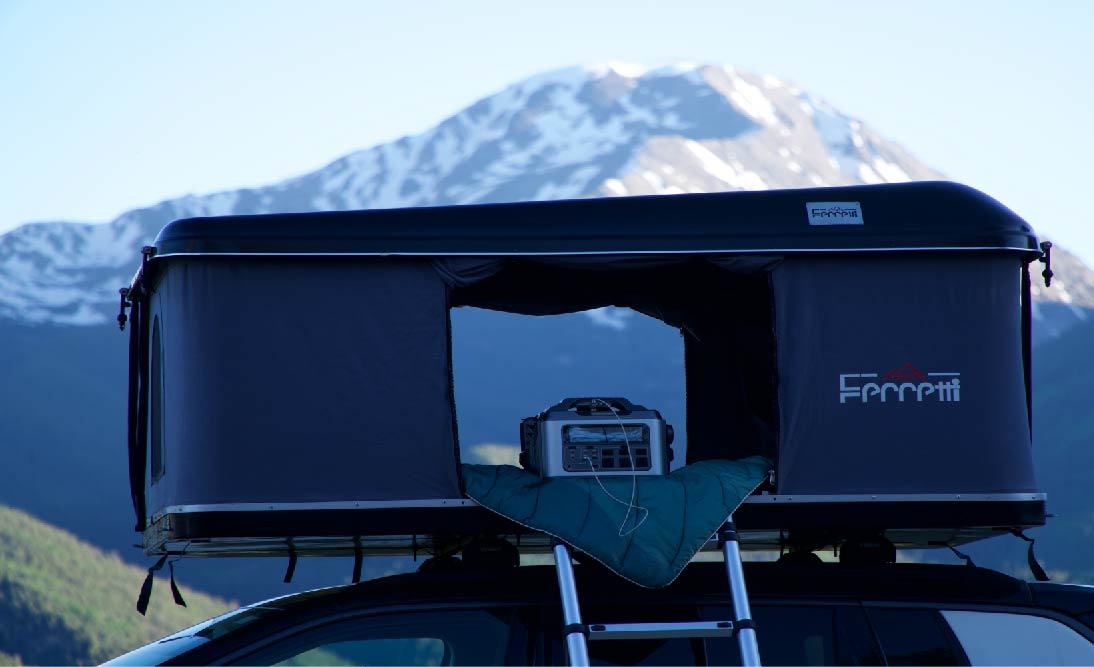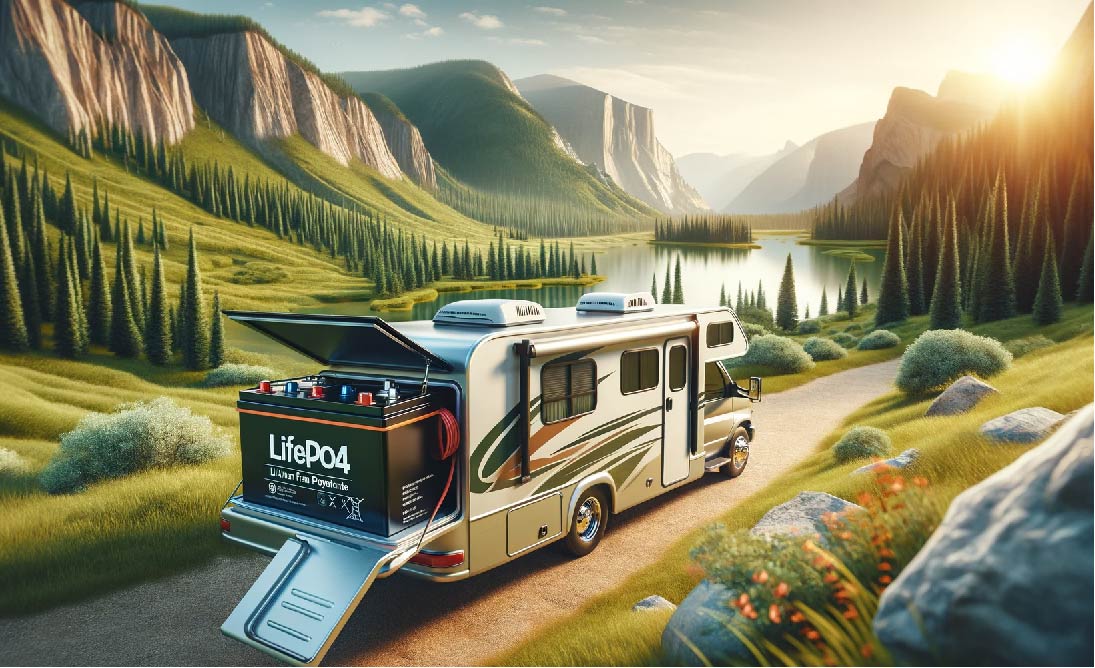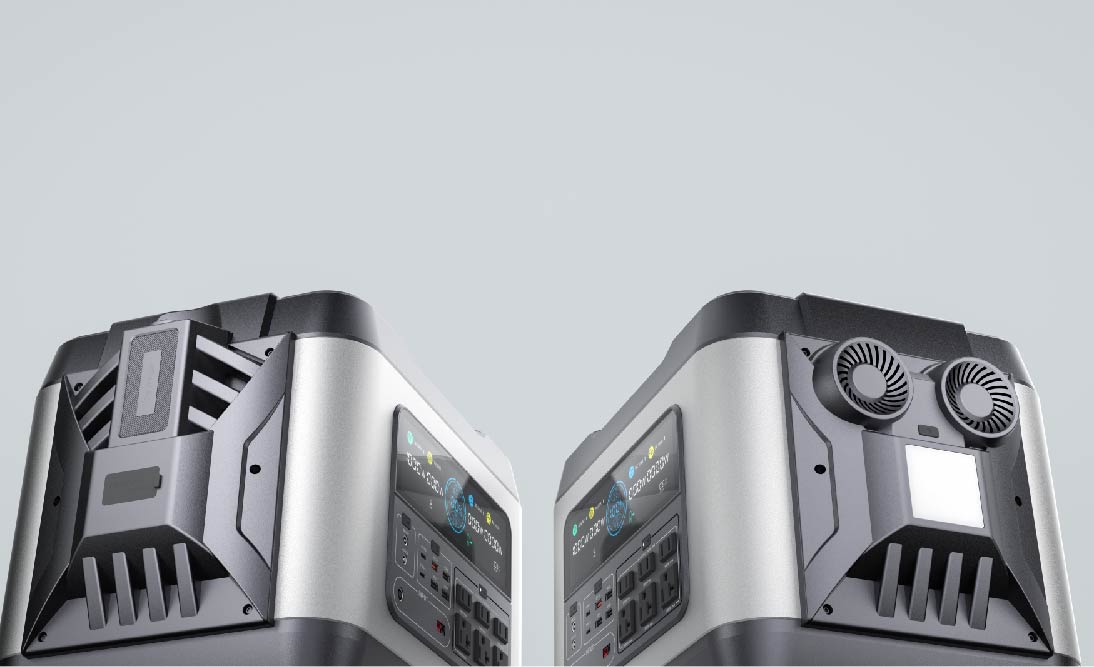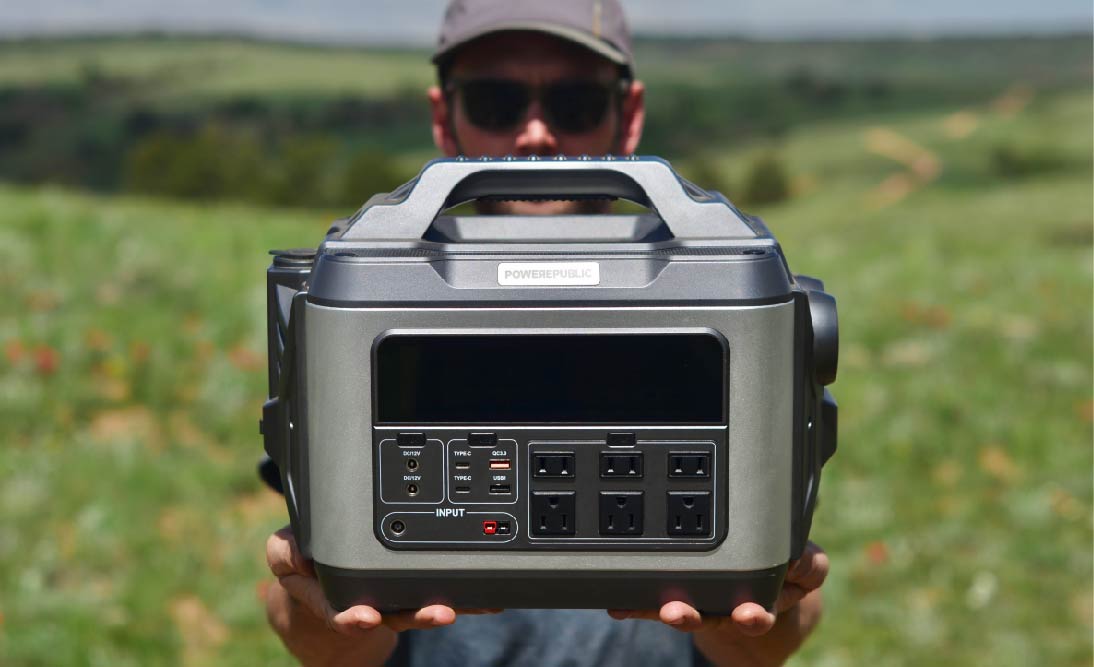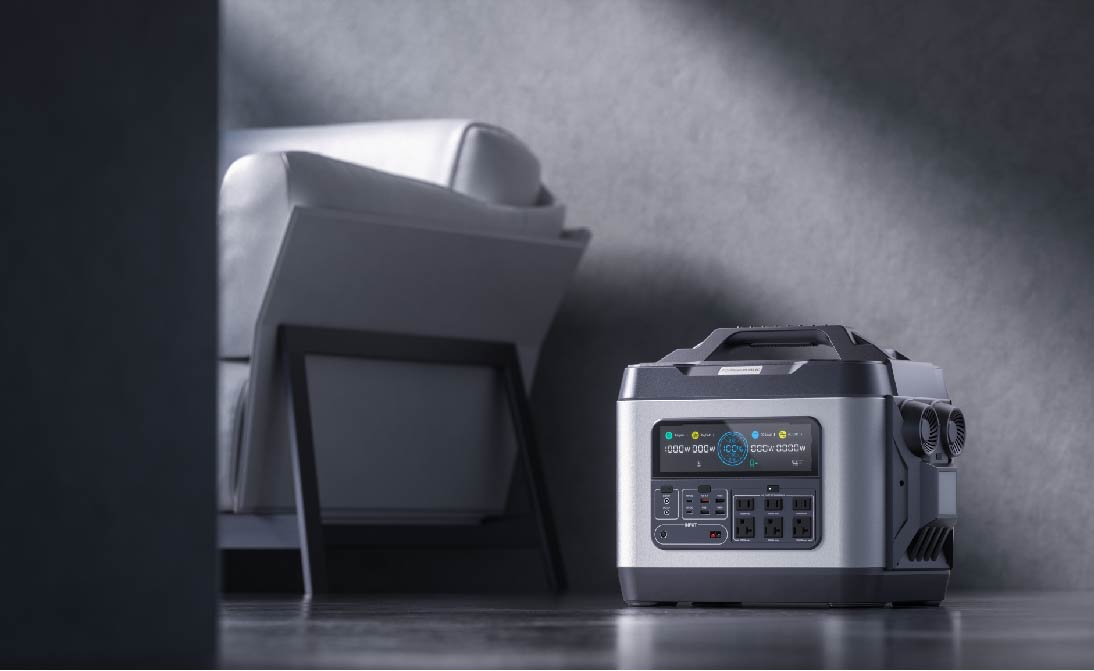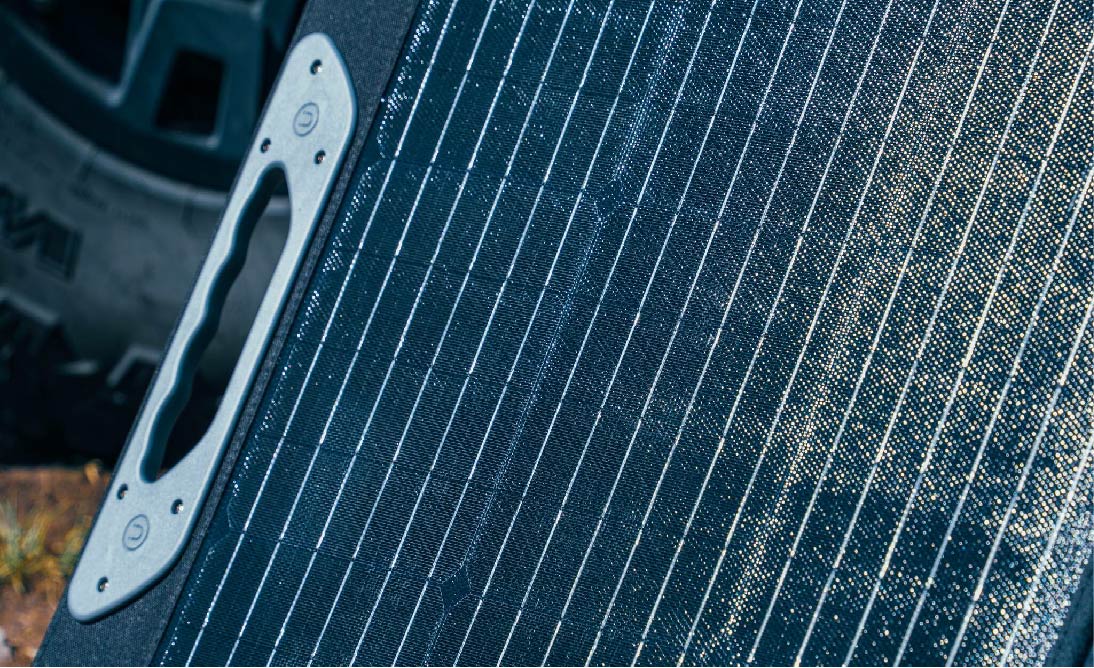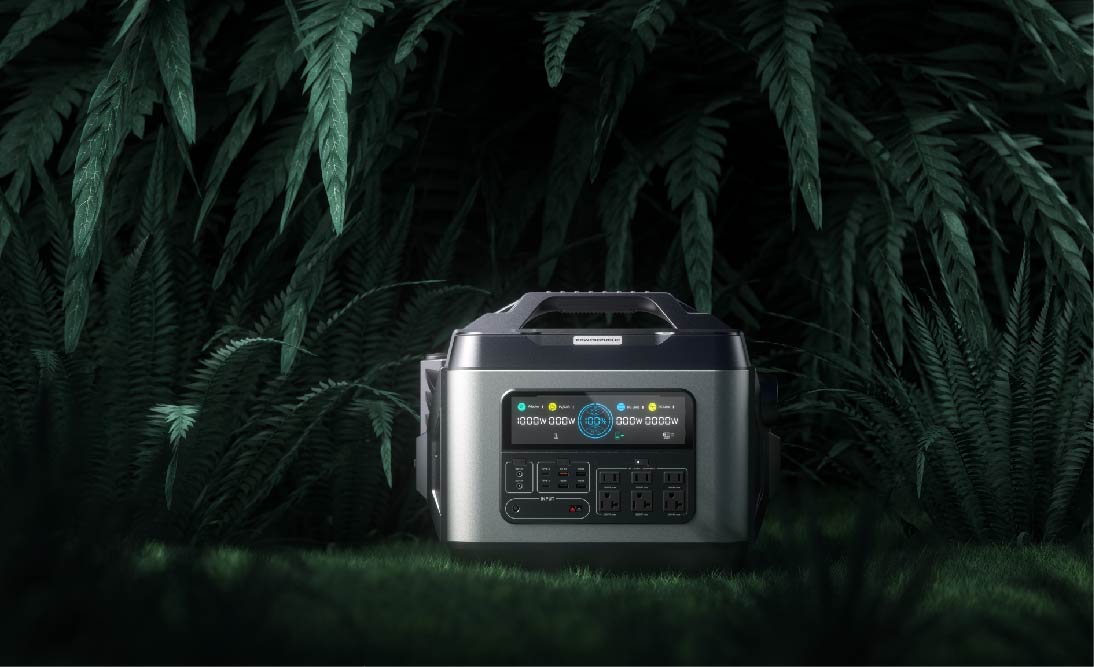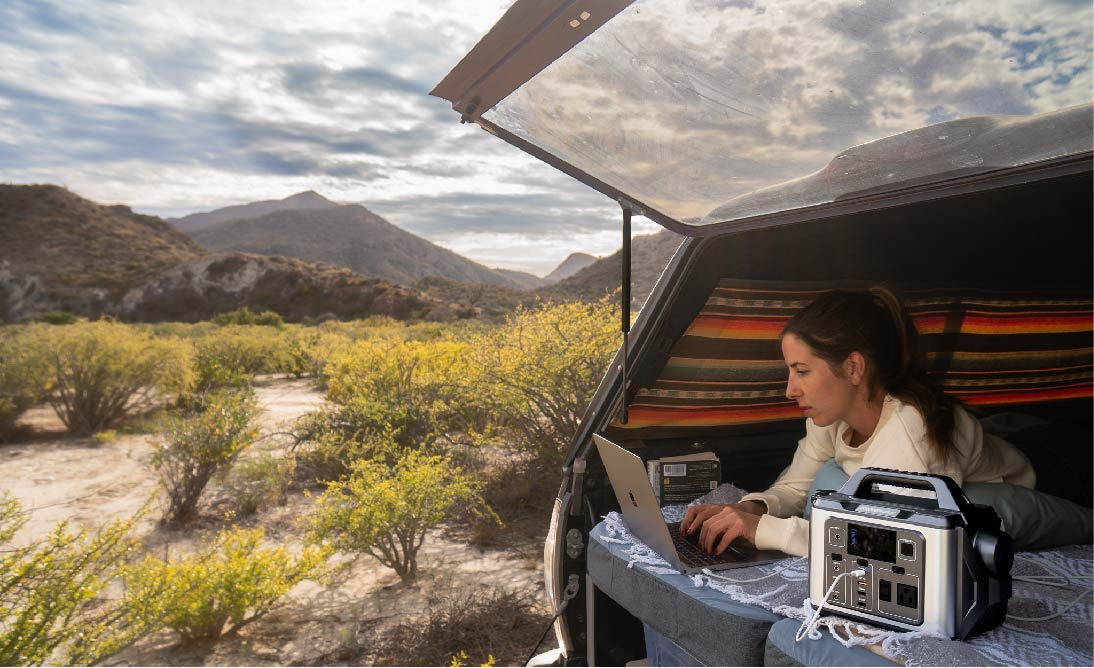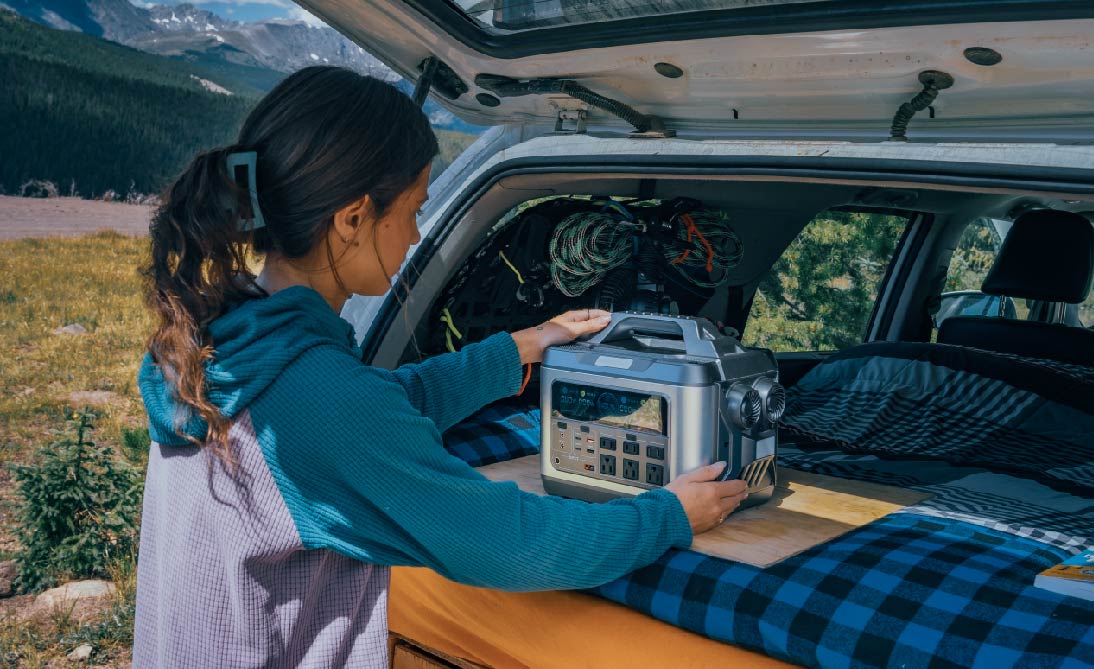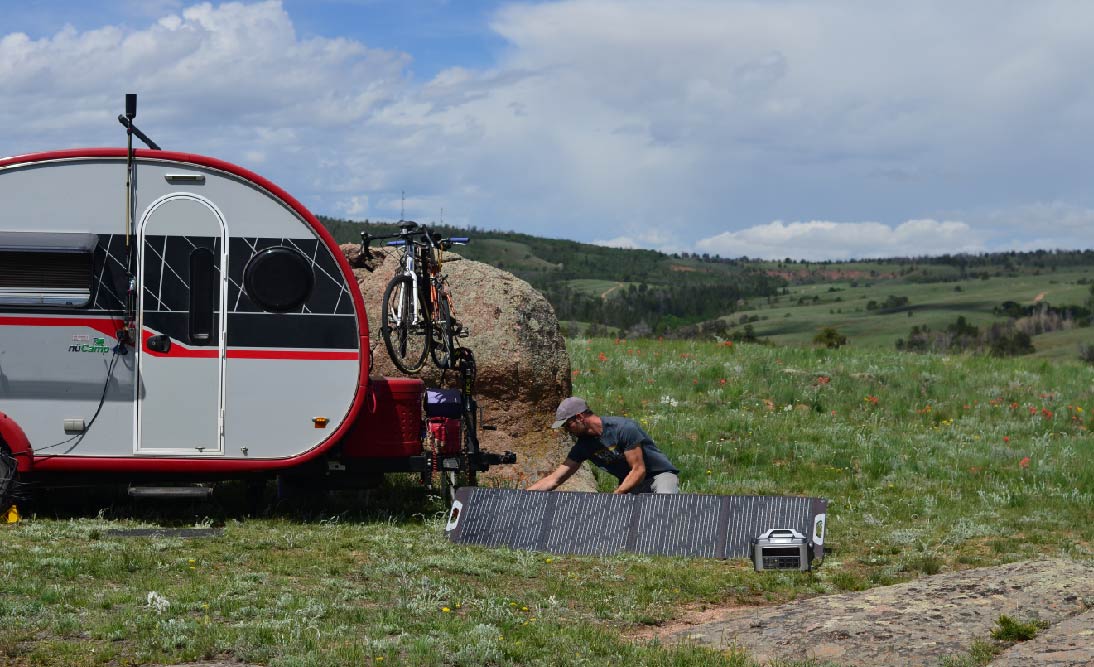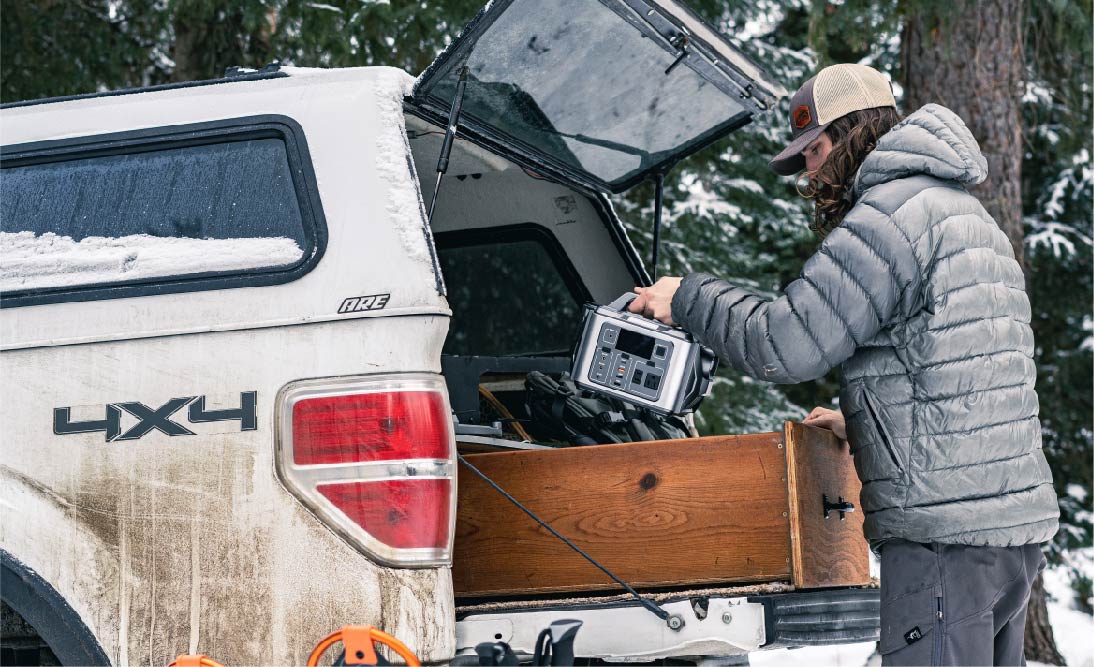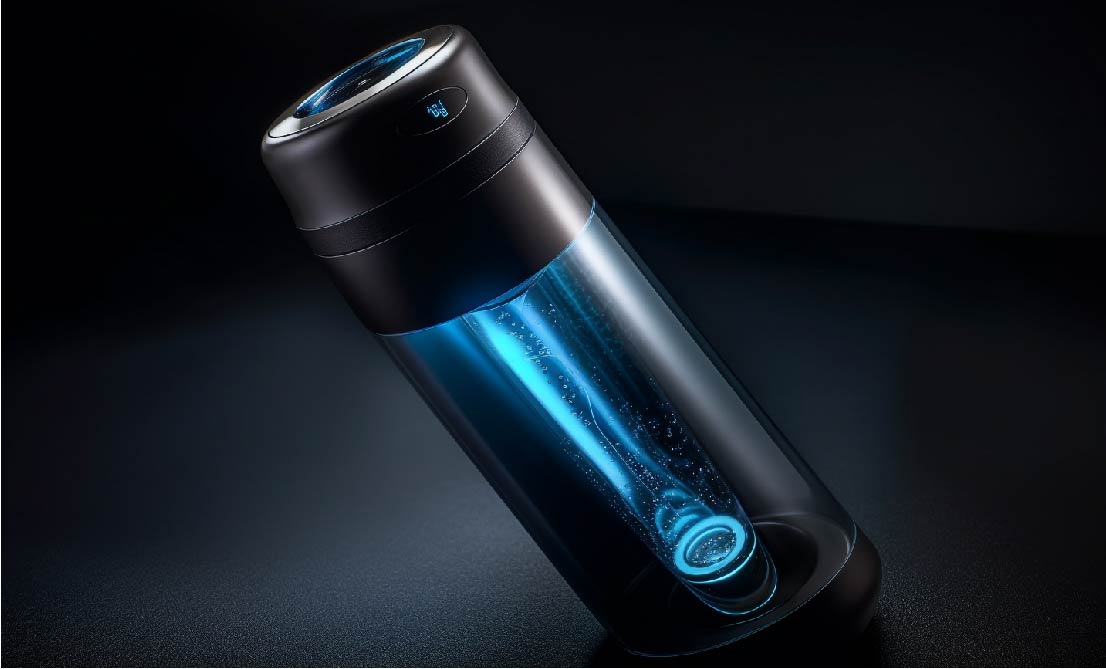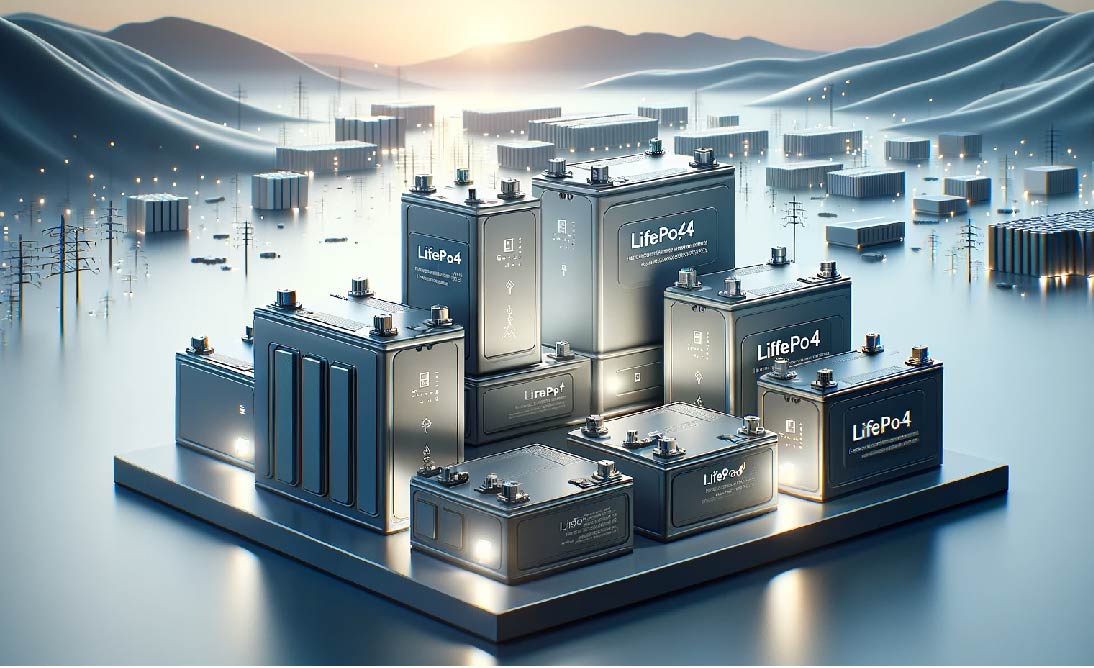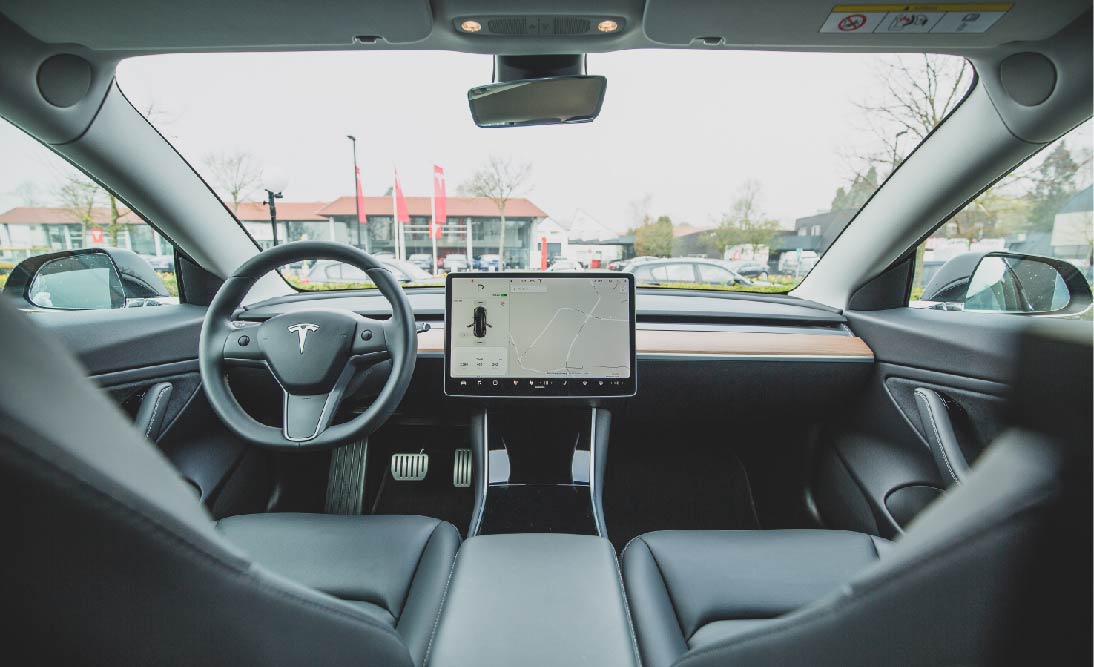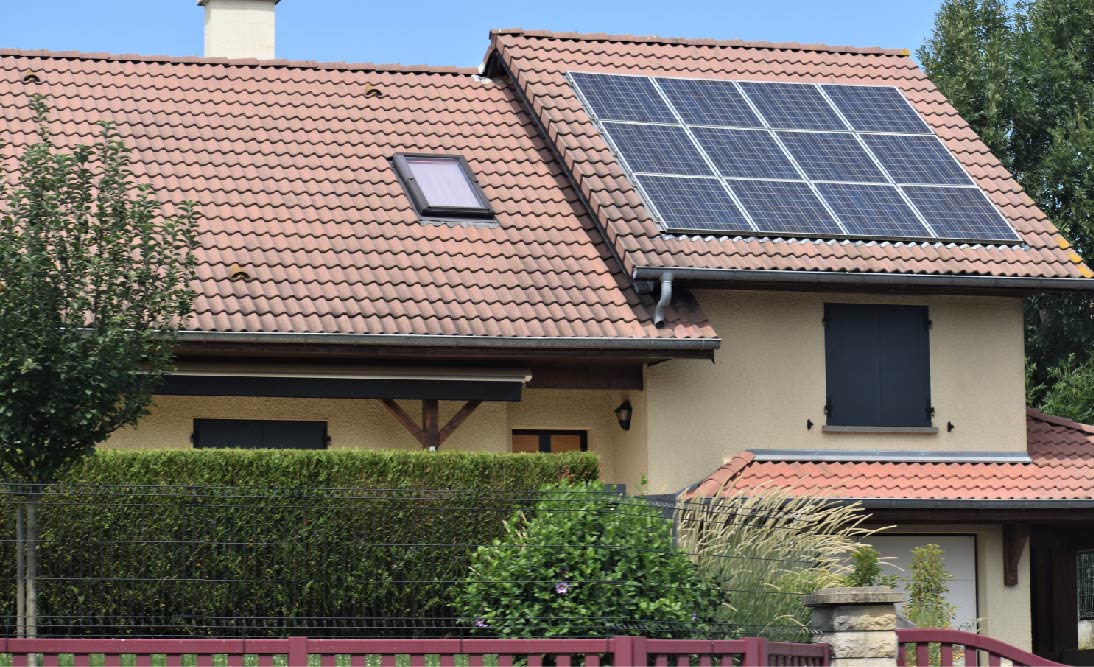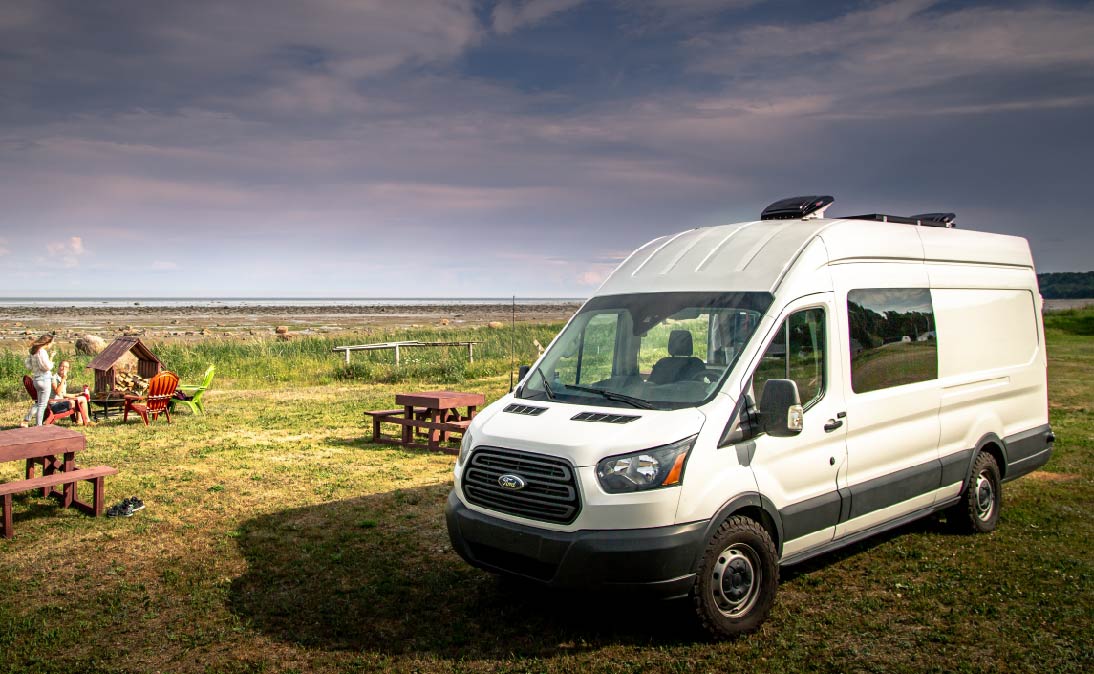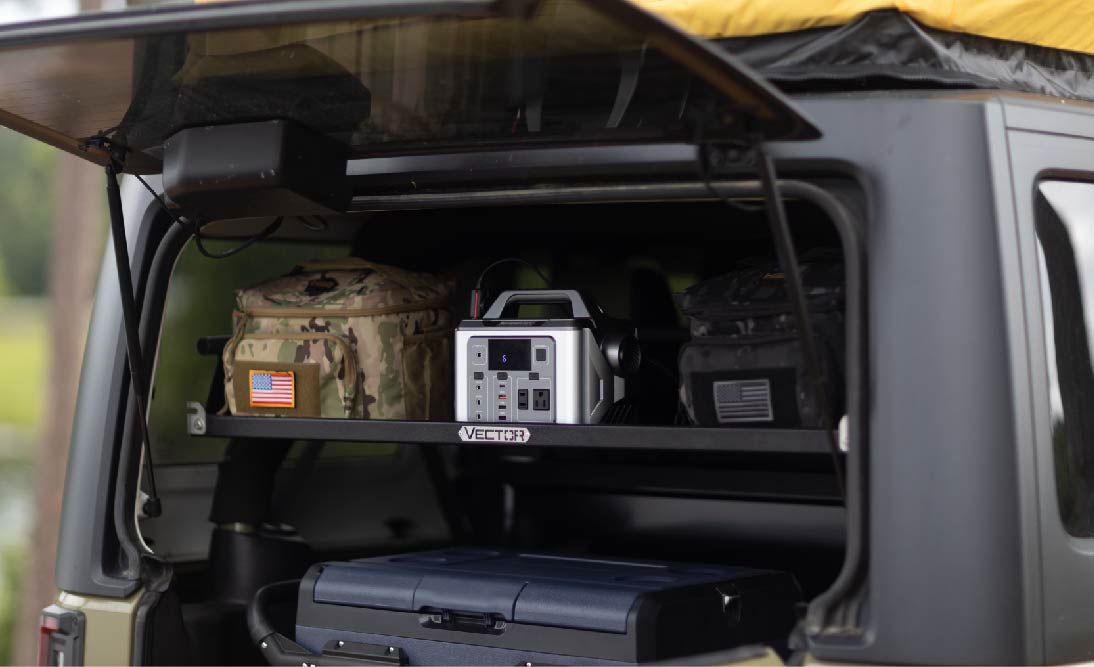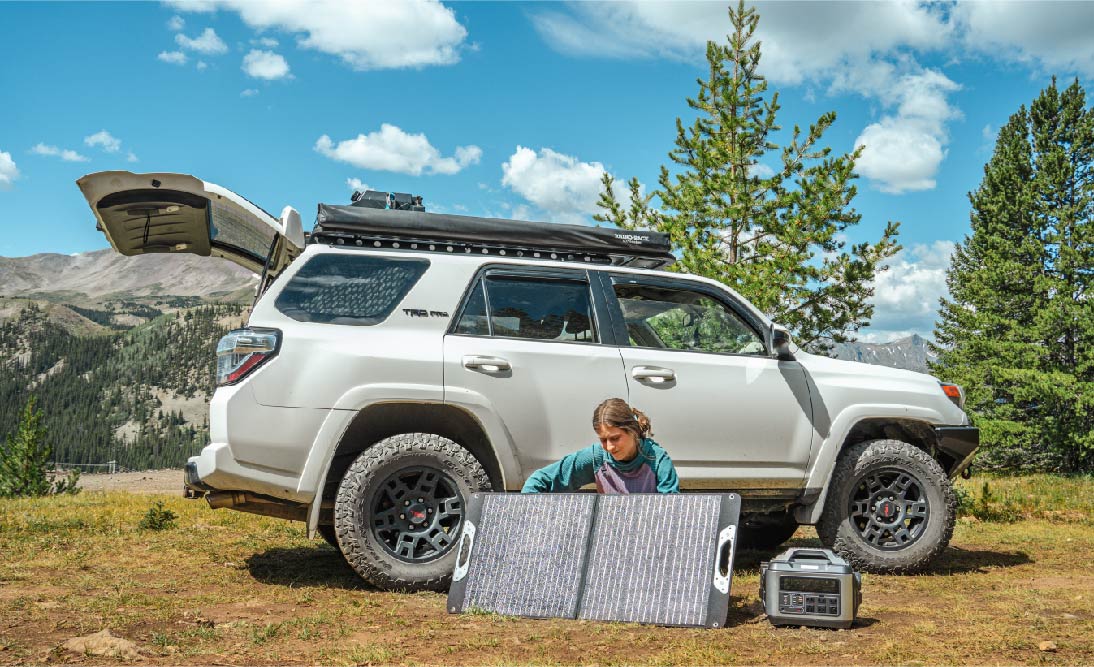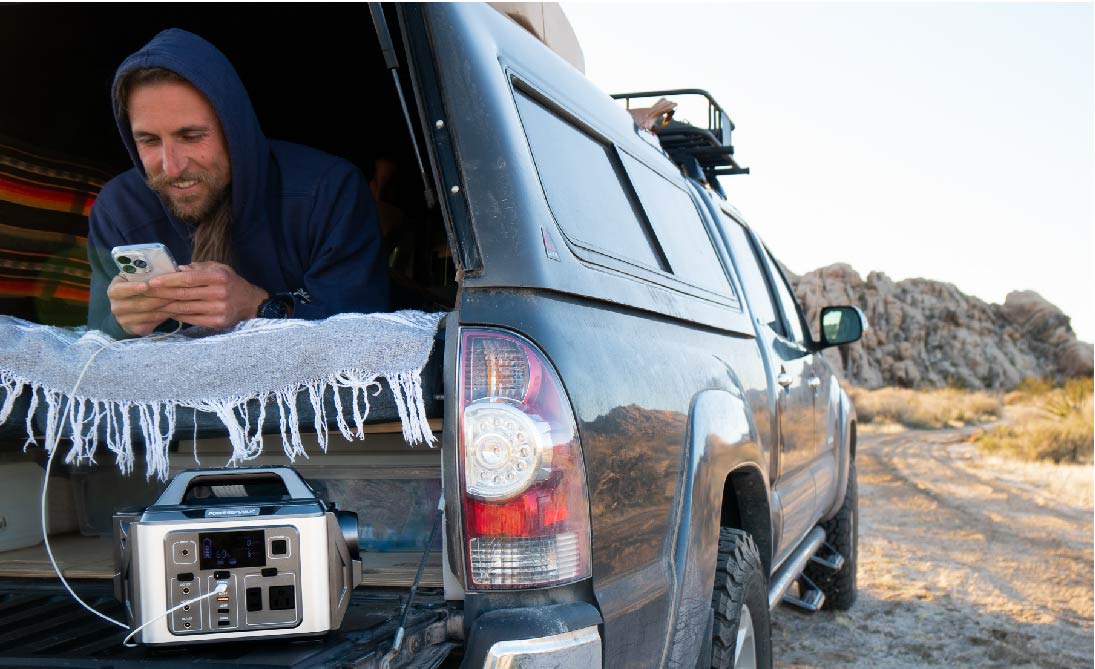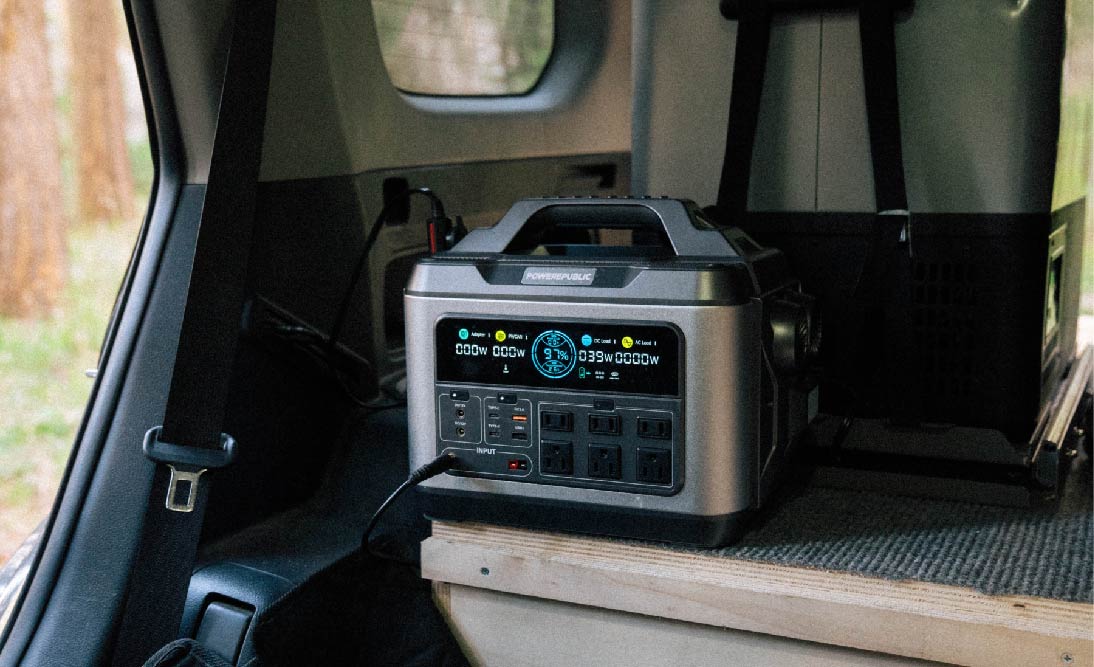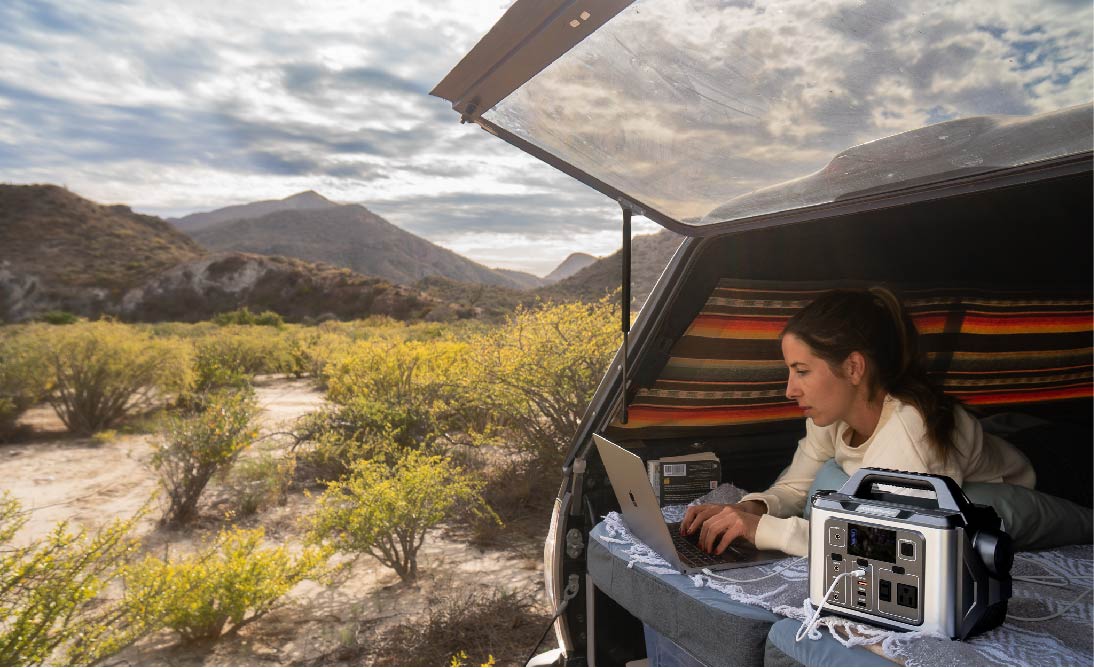Table Of Contents:
Whether you like to go outdoors or live off-grid, having reliable power solutions is a great choice. They ensure you have enough power to charge all your devices and enhance your off-grid experiences. Options like traditional generators, inverter chargers, solar generators for RVs, and DIY solar generator systems are very popular among people. But here comes the question: which one is the most suitable for you?
In this article, we will provide a brief guide on solar generators for RVs, how they work, what you can do with them, and the pros and cons of having a solar-powered generator for your RV. Let’s get started!
Types Of Generators For RVs

When it comes to building up your power system for your RV, there are 4 different types of options:
-
Traditional Generators: Traditional generators are often fueled by gasoline, propane, or diesel and are designed to provide consistent and reliable power. They are known for their ability to produce a high amount of electricity and are typically used for powering all appliances and devices within an RV. These generators can be quite noisy and require regular maintenance, but they offer a robust power supply for extended periods.
-
Inverter Chargers: Inverter chargers combine the functions of an inverter and a battery charger in one unit. They serve the purpose of transforming DC (direct current) power into AC (alternating current) power, enabling the operation of a wide array of appliances and devices within your RV. They are particularly useful for RVs with solar panels and batteries, providing a more efficient and quiet power source while also charging the RV's battery bank.
-
Solar Generators for RVs: Solar generators for RVs harness the power of the sun to generate electricity. They consist of solar panels, a charge controller, and a battery bank. The panels capture solar energy and convert it into electricity, which is stored in the batteries. This green and silent power source is perfect for eco-conscious RVers and those who prefer a quiet and sustainable power solution.
-
DIY Solar Generator Systems: DIY (Do-It-Yourself) solar generator systems allow RV owners to build their custom solar power setups. These systems involve selecting and installing solar panels, a charge controller, and batteries and often require some technical expertise. DIY systems offer the flexibility to design a solar power solution tailored to the specific needs and budget of the RV owner.
Each of these options has its own set of advantages and considerations, enabling RV owners to choose the system that best suits their preferences, requirements, and environmental values. By knowing these options, RVers can have a better idea of what options they can have. Next, let’s talk about what we are going to focus on here: RV Solar Generator.
Knowing The Purpose Of An RV Solar Generator

RV Solar Generators, also known as Solar-Powered Generators, are versatile all-in-one devices designed to deliver reliable off-grid power solutions for recreational vehicles. These compact units combine several essential components, such as inverters, converters, batteries, charge controllers, and solar panels, into a single, self-contained package. Solar generators can be recharged via AC outlets, portable solar panels, or your vehicle’s car socket.
Whether exploring the great outdoors or living on the road, RV Solar Generators offer the freedom to power your devices and appliances with clean, sustainable energy. Discover how these innovative systems can enhance your RV adventures and provide you with a reliable source of electricity wherever you go.
How Do RV Solar Generators Operate?

RV Solar Generators are an innovative solution that provides power to recreational vehicles, especially in off-grid scenarios. To understand how these systems work, let's delve into their operation.
1. Battery Charging: The first step is battery charging. This is typically accomplished through two primary methods:
-
Solar Panel or Car Battery Charging: RV Solar Generators are equipped with solar panels that capture sunlight and convert it into direct current (DC) power. In addition, they can charge from the RV's engine or a secondary car battery. A Charge Controller regulates this incoming power to ensure efficient charging.
-
AC/DC Conversion: Alternatively, these generators can draw power from an external AC (alternating current) source, which is then converted into DC power by an
2. Inverter Power Conversion: After the battery is charged, the generator's Inverter takes center stage. It converts the stored DC power into the more common alternating current (AC) power, making it compatible with a wide range of appliances and devices commonly found in RVs. This converted AC power can effectively run refrigerators, air conditioners, lighting, and more, providing the comfort and convenience of a home even wha en off the grid.
RV Solar Generators are an ideal power solution for RVers who value independence and sustainability. Their efficient operation and eco-friendly nature make them an excellent choice for adventures on the open road and off-grid experiences.
Is It Possible To Power Your RV Using Solar Generators?

The answer is YES!
An RV solar generator holds the potential to power your RV, offering a sustainable and eco-friendly energy solution. However, ensuring the total energy needs match the output power and battery capacity of the solar generator is crucial for seamless operation.
The key question: Can you rely solely on an RV solar generator for uninterrupted power supply? The answer is a resounding yes. To achieve this self-sufficiency, you need to determine two critical factors:
-
Total Watts Requirement: Calculate the total Watts of your need by summing up the device ratings found on their labels. For devices without Watt ratings, you can use the formula below to get the wattages: Watts = Voltage(V) x Current(A).
-
Figure Out Total Watt-hours: To calculate how many watt-hours, you can use the formula below: Watt-hours = Watts x hours.
Once you've determined the Watt-hour, simply add them all together to find the total daily Watt-hours needed for your RV power system. This figure is crucial in ensuring that your solar generator can meet your daily energy demands effectively.
After figuring out the 2 things above, you can determine:
1. Inverter Size: To determine the inverter size, it's recommended to aim for around 120% to 150% of the total power(W) for optimal performance. This can be calculated by multiplying the total power(W) by a factor of 1.2 or 1.5.
2. Battery Capacity(Ah): You can find the right-sized battery by dividing the capacity of the RV battery(Wh) by your RV's battery voltage (usually 12V):
Battery capacity(Ah) = 2 x (Capacity Of The RV Battery(Wh) / 12V)
For example, if the capacity of the RV battery is 2400Wh and the battery voltage is 12V, you will need a battery with:
Battery capacity(Ah) = 2 x (2400Wh / 12V)=400Ah.
How Many Solar Panels You Need? You can use the formula below to estimate:
Number of Solar Panels = Daily capacity in Wh/ (Daily Sun Exposure in Hours x Panel Wattage Of The Solar Pane in Watts).
For example, if your total Watt-hours equal 5000Wh, the daily sun exposure is about 5 hours, and your solar panel wattage is 200W, thus
Number of Panels = 5000Wh / (5 hours x 200W) = 5 pieces. Therefore, you'll need 5 pieces of 200W solar panels.
You can consider using our online solar-powered calculator for a more streamlined approach to these calculations. Mastering these fundamentals empowers you to make the most of your RV solar generator, ensuring a seamless and uninterrupted solar-powered adventure.
Is It Possible To Charge Your RV Battery Using A Solar Generator?

Yes, it is possible.
Charging your RV's batteries with a solar generator is an efficient and eco-friendly way to keep your power supply running smoothly.
RVs typically feature the 2 following batteries to serve different purposes. There are house batteries, primarily responsible for supplying power to onboard electronics and appliances within the living quarters of the RV. In contrast, starter (chassis) batteries are designed to kick-start the RV's engine, providing the necessary energy to get the vehicle up and running. These two battery types cater to separate functions within the RV, ensuring that both the living space and the engine receive the appropriate power supply.
To connect your RV to a solar generator for battery charging, follow these steps:
-
Power Conservation: Commence the process by optimizing power consumption within your RV. Prioritize the deactivation of power-hungry appliances and electronics, especially those with high energy demands, such as air conditioning units. This action aims to enhance the overall efficiency of your solar generator.
-
Solar Generator Activation: Energize your solar generator and ensure it is strategically positioned to receive maximum sunlight exposure. This may necessitate deploying solar panels or placing the generator in a sunlit location to harness solar energy effectively.
-
Secure the Connection: To establish a connection between your RV and the solar generator, look for a solar generator with a socket of 30A. If your solar generator doesn't come with a 30A socket, you can make use of an adapter that can convert 15A to 30A for a successful connection. This step ensures a smooth and secure link between your RV and the solar generator, allowing for efficient power transfer.
-
Internal Circuit Check: Within your RV, inspect the fuse(circuit breaker) associated with the RV's converter. The converter plays a crucial role in transforming solar-generated power into a voltage suitable for battery charging. Confirm that the circuit breaker is in the "on" position and functioning correctly. Typically, you can locate the circuit breaker for the converter in the RV distribution box, often labeled as 'CONV.'
-
Monitoring the Charging Process: Monitor the status of battery charging to ensure it progresses as anticipated. Many modern RVs incorporate onboard battery management systems that display the current battery charge status. Regularly check this display to ascertain when your batteries reach full charge capacity.
By following these steps, you can effectively charge both your house and starter batteries with a solar generator. This sustainable approach not only keeps your RV powered but also reduces your carbon footprint, making your adventures more eco-friendly.
Factors To Consider Before Buying Solar Generators For Your RV?

-
Battery Capacity: The battery capacity is a crucial factor. Ensure that the solar generator's battery has enough storage capacity to meet your power requirements, especially during periods of low sunlight or nighttime. A larger capacity battery will provide longer-lasting power.
-
Inverter: When selecting a solar generator for your RV, opt for one equipped with a pure sine wave inverter. This choice ensures efficient and secure powering of a broader spectrum of devices, surpassing the capabilities of a modified sine wave inverter. Moreover, it's essential to verify that the inverter's capacity aligns with both your continuous and surge power requirements. This comprehensive approach guarantees that your solar generator can adeptly handle the diverse power demands of your RV.
-
Expandability: Opt for an RV solar generator that allows for expandability. This means the ability to add extra batteries or solar panels to increase energy storage capacity or capture more solar energy. This ensures adaptability as your energy requirements grow.
-
Socket Outlet: A solar generator with a socket with 30A is essential, particularly if you intend to power high-current appliances or plug them into your RV. This outlet type ensures you can run power-hungry devices efficiently.
-
Different Ports: Look for a solar generator with multiple plugin ports to accommodate various devices and charging needs for your RV. These ports can include USB ports for small electronics, a lighter port, and 110V AC outlets for standard household appliances. A variety of ports enhances the versatility of your power source.
-
Weight and Portability: Another important factor is the weight and portability of the solar generator. Consider the size and weight, as it should be manageable for your RV setup. A compact and lightweight design makes transportation and storage more convenient during your travels. However, it's worth noting that the significance of this factor depends on your power needs. If you require power for high-wattage devices and appliances, you will need a solar-powered generator with higher output power and capacity. In this case, the RV solar generator may be less portable and heavier.
These factors will help you choose a solar generator for your RV that aligns with your power needs and ensures a reliable and efficient power source for your RV adventures.
How To Determine The Best Solar Generator For Your RV?

Here, the term “BEST” is defined by whether a solar generator can perfectly satisfy your needs.
Selecting the best solar generator for your RV is a decision deeply rooted in understanding your power needs. Your choice will significantly impact the comfort and functionality of your RV adventures. Here's how to determine the ideal solar generator for your specific requirements by focusing on knowing your power needs:
-
Assess Your Energy Demand: The first step is to evaluate your RV's energy consumption. Make a comprehensive list of all the devices and appliances you plan to power, along with their power consumption in watts. This includes everything from lights, laptops, and phones to larger appliances like refrigerators, air conditioners, and microwaves.
-
Determine Continuous and Surge Power Requirements: Some devices, like refrigerators and air conditioners, require more power during startup (surge power) than they do when running continuously. Ensure the solar generator's inverter can handle both your continuous and surge power needs, so you can comfortably operate all your devices.
-
Calculate Total Daily Energy Consumption: Estimate how many hours each device will be in use daily and calculate the total energy consumption in watt-hours (Wh) for a typical day. This figure will help you determine the daily power requirement of your RV.
-
Consider Battery Capacity: Your solar generator's battery capacity should be sufficient to meet your daily energy needs, allowing for a reserve to cover cloudy days or high-demand periods. Larger batteries offer more energy storage, reducing the need for frequent recharges.
-
Understand Solar Panel Capacity: The solar panels connected to your generator will determine how quickly you can recharge the battery. Ensure your solar panel capacity matches or exceeds your daily power consumption to maintain a consistent power supply.
-
Balance Weight and Portability: As you consider the solar generator's size and weight, remember to balance these factors with your power requirements. If you need to power high-wattage appliances, you might need a larger, less portable generator. Conversely, if you prioritize portability, be mindful of your power limitations.
-
Evaluate Expandability: Opt for a solar generator that allows for expandability, such as adding more batteries or solar panels. This future-proofs your setup, accommodating increasing power demands as your needs evolve.
-
Prioritize Quality and Reliability: Invest in a reputable solar generator with a proven track record. Quality and reliability are key, as a dependable power source is essential for a stress-free RV experience.
By thoroughly understanding your power needs and considering these factors, you can confidently select the best solar generator for your RV. Tailoring your choice to your specific energy requirements ensures that you'll enjoy a comfortable and uninterrupted power supply during your travels.
Pros & Cons Of RV Solar Generators

As we mentioned above, there are 4 types of power solutions for RV: traditional generators, inverter chargers, DIY solar generator systems, and solar generators for RV.
The table below shows the comparison of the RV solar generators with the other three:
|
Aspect |
Solar Generator for RV |
Traditional Generators |
Inverter Chargers |
|
|
Environmental Impact |
Environmentally Friendly |
Emissions |
Environmentally Friendly |
Environmentally Friendly |
|
Power Output |
Suitable for Light to Moderate Loads |
High Power Output |
Efficient Power Conversion |
Customizable |
|
Dependence on Fuel |
No Fuel Costs |
Fuel-Dependent |
Fuel-Independent |
Silent Operation |
|
Portability |
Portable and Lightweight |
Cumbersome to Move |
Portable and Lightweight |
Portable and Lightweight |
|
Installation and Maintenance |
Low Maintenance |
Regular Maintenance Required |
Low Maintenance |
Low Maintenance |
|
Power Output Flexibility |
Limited Capacity for High-Wattage Appliances |
Reliable in Various Weather Conditions |
Efficient Power Conversion |
Customizable |
|
Initial Cost |
Higher Initial Setup Cost |
Affordable Initial Cost |
High Initial Cost |
Affordable Initial Cost |
This table offers a straightforward comparison of key aspects between a solar generator and the other three types, allowing you to make an informed choice based on your power needs and preferences.
POWEREPUBLIC Solar Generator Kits
If you are looking for an ideal solar generator for your RV, consider POWEREPUBLC T1200 and T2200 solar generator kits.
POWEREPUBLIC T1200 Solar Generator Kits

There are two POWEREPUBLIC T1200 solar generator kits: T1200+ PV100 and T1200+PV200. It is your choice to choose between PV100 and PV200. If you want to recharge T1200 faster, choose PV200 over PV100. If you value portability, choose PV100 over PV200.
POWEREPUBLIC T1200 portable power station has an output power of 1200W, and a capacity of 1110Wh, making it ideal for charging both your essential electronic devices and some larger items like coffee makers, blenders, electric blankets, mini-fridges, and so forth. With 13 different output ports, you can charge 13 devices simultaneously. Also, the aluminum alloy body together with the distinctive design, makes it super durable and rugged-looking.
If you are looking for a solar generator for an RV that perfectly balances portability, versatility, and functionality, these 2 options are great choices.
POWEREPUBLIC T2200 Solar Generator Kits

If you want to power some appliances with rated power over 1500W, a POWEREPUBLIC T2200 solar generator would be a fantastic fit.
First, our T2200 is double the standard compared to our T1200. With 2200W output power and 2240Wh capacity, it can handle almost 95% of the devices and appliances. Not to mention the 15 output ports, making it so powerful to charge 15 items all at once.
Second, Our T1200 has built-in LiFePo4 batteries with a lifecycle greater than 3000+, meaning that you can use it for at least 3000 times from 100% to 0% and change it from 0% to 100%.
That’s not the end of it, the aluminium alloy body together with the distinctive design, makes it super durable and rugged-looking. So if you are looking for an RV solar generator that can almost cover all the appliances, consider POWEREPUBLIC T2200 solar generator kits.
Conclusion
In conclusion, when it comes to powering your RV, the choice of a solar generator offers a host of benefits, especially for those who prioritize sustainability, energy independence, and off-grid adventures. RV solar generators provide a reliable, eco-friendly power source that can accommodate a wide range of electrical needs.
Understanding your energy requirements and matching them with the appropriate solar generator is key to making the most of this solution. Whether you opt for the portability and versatility of the POWEREPUBLIC T1200 series or the higher power output of the T2200, your choice should align with your specific power needs and preferences.
In this era of eco-conscious travel and sustainable living, RV solar generators offer a compelling and practical solution for enhancing your RV experience, reducing your environmental impact, and ensuring a consistent source of electricity during your journeys. Make an informed decision to elevate your RV adventures with clean, efficient, and sustainable power.
